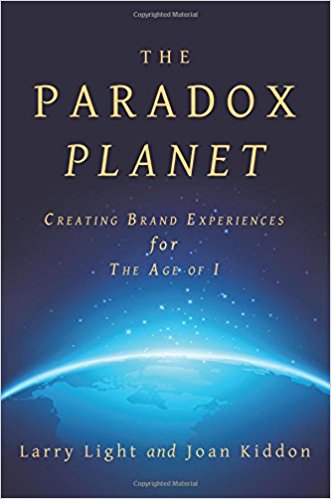The Pursuit of Perception: The New Dimension of Personalization
Marketers: if you have not already reread your copy of Aldous Huxley’s, The Doors of Perception, now is the time. The trend of using planted-based psychedelics– that is, mushrooms – is once again a desired experience. That 1960’s “turned on, tuned in” experience of opening one’s inner doors to greater personal perceptiveness and universal understanding is now increasingly desired. Jim Morrison must be looking down and smiling with an “I told you so” grin.
The need for self-knowing, perceptual experiences that help us be better people is real. And, this deep desire to understand ourselves and the world is changing the concept of personalization. Some CMOs describe this as the more emotional component. Actually, it goes beyond emotional to spiritual.
For several years, personalization has been a desired brand benefit. Personalization still is desired. We appreciate products and services designed to satisfy our individual needs in ways that might not work for someone else. Brands can address you personally with recommendations, specific promotions and worthwhile information. Hotels can remember how you like your mini-fridge stocked. Airlines know how frequently you fly and how you want to be rewarded. Personalization is a status symbol. Personalization is part of our external image of success and our internal image of achievement. This is because personalization delivers an individualized recognition of who we are. Personalization is powerful because of the use of real time digital responsiveness and data collection.
Brands delivering data-driven personalized experiences are valuable brands. Brands offering personalized experiences reinforce respect and uniqueness. All of this is good. The ability to factor down messaging to an audience of one across millions of users and viewers has been profitable. This type of personalization, all pervasive in today’s world, can also, unfortunately, be seen as self-centered and somewhat superficial. It generates an “all about me” sensibility.
So, in our slightly dystopian, worrisome world, weary people are looking for a different type of personalization, something with more meaningfulness. People want more connection, not so much with like-minded others although that is still a huge desire, but with one’s inner self, with the truth about who they are while gaining some sort of existential understanding about the world.
More than mindfulness (an awareness of something), research shows meaningfulness is associated with life satisfaction, happiness and positive wellbeing. Meaningfulness is intensely personal.
Marketers should be expanding their definitions of personalization to include the meaningful pursuit of connections with the more “spiritual, soulful” side of their customers’ sense of self. Many people are seeking true self-perception. This dimension of personalization is about empowerment, healing self-transformation and personal resetting. Think of this as yoga on steroids.
This need for self-enlightenment goes beyond the commercial wellness industry as highlighted in Bloomberg BusinessWeek, “This Vacation Is a Real Trip: Psychedelic experiences are beginning to play an integral role at luxury resorts.” Bloomberg points out that spas designed around opening one’s doors of perception are big business. Additionally, the “shroom boom” as some call it, is also playing an important therapeutic role in treating a variety of medical issues including depression, PTSD and other trauma, substance abuse and pain.
Increasingly, what used to be regarded as a recreational experience for hippies, dead heads, festival goers and the EST set (Erhard Seminars Training, the new age awareness groups held from 1971 to 1984) is seen as a respectable personal pathway for achieving heightened self-understanding, personal development and taking responsibility with physical and emotional relief. As Timothy Leary famously said, “You have to go out of your mind to use your head.”
The state of California, Denver, CO, Oakland, CA, Santa Cruz, CA, Grand Rapids and Ann Arbor, MI, Cambridge and Somerville MA have all passed legislation to decriminalize possession of the active ingredient in “magic” mushrooms – psilocybin, as well as LSD, mescaline and DMT, the active ingredient in ayahuasca.
And, although psilocybin is still a powerful Schedule 1 drug in the US, there appears to be some universal recognition that people want help understanding themselves and their individual purpose on earth. Faced with the pressures and difficulties of life in today’s coronavirus world, people are seeking critical insight into how to be the best human being they possibly can.
Some brands are actually delivering on the inspirational, personal perceptual experience.
For example, Silo Wellness describes itself as a “legal psychedelic and functional mushroom company focused on your mind, body and spirit. Silo Wellness cultivates psychedelic mushrooms and offers retreats in Jamaica and Oregon and products”. Most recently, as stated in The New York Post and other information outlets, Silo Wellness has launched a brand called Marley One. Marley One is a brand of psychedelic mushroom products.
Medicinal mushrooms are appearing in beverages and wellness products, similar to the proliferation of CBD edibles, tinctures and creams.
Research from Mordor Intelligence highlighted in Financial Services Monitor Worldwide indicates that in 2020, the global functional mushroom business was US $12,415.12 million. Mordor Intelligence estimates that from 2021-2026 the business will register a CAGR of +8.4%. Mordor Intelligence reported expectations of functional mushrooms seeing growth beyond healthcare and pharmaceuticals but into the food and beverage sector.
Not all brands are or should be peddling the magical. However, the broadening of personalization is more than a mere fad. People want to open doors to new self-awareness. For brands and marketers, this additional intensely spiritual dimension to personalization means there is work to be accomplished now. Brands need to take this into account. Technological and digital connections alone may not help brands accomplish this. Marketers need to pay attention.
- Knowing the prime prospect should include more than opinions, attitudes, buying habits and demographics. What are your prime prospects’ intentions regarding actions to improve self-understanding and experiences? How can your brand support this? Who do prime prospects think they are and what do they wish to become?? How does that affect the brand? Does the brand’s personalization efforts sync with the users’ current self-assessments?
- Knowing problems that the prime prospect may have with the brand should be examined on functional, emotional, social and “spiritual” levels. Problem detection can run to the more functional.
- When thinking about the brand’s ease of choice, ease of use and ease of mind, marketers should put more effort into understanding how the brand affects the customer’s ease of mind. People put a lot of emphasis on self-perception, open-mindedness and insight.
In a recent column for The New York Times on neuroscience, holistic brain research and how we construct our realties, David Brooks quotes a neuroscientist from the University of Sussex. Professor Anil Seth stated, “Perceptions come from the inside out just as much, if not more, than from the outside in.”
Along with how people perceive brands, marketers must now start understanding how people wish to perceive themselves. These insights will be crucial for engaging customers with truly personalized experiences.

Learn more about paradoxes like this one: Navigate how to satisfy conflicting needs, and look beyond single-minded solutions with the insights and guidance in The Paradox Planet.



